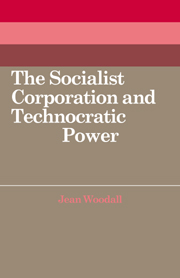 The Socialist Corporation and Technocratic Power
The Socialist Corporation and Technocratic Power Published online by Cambridge University Press: 07 October 2011
The climate of economic policy in the late 1960s is most important when trying to understand the reforms in industrial structure. The phrase ‘scientific-technological revolution’ peppered the debate on growth strategy. It was the scientific-technological revolution that would harness the forces of production and enable the Polish economy to travel across the threshold of extensive to intensive development. At the Fifth PZPR Congress in 1968, great emphasis was placed upon raising a flagging growth rate while simultaneously improving individual and social consumption. Annual increases in labour productivity of between 5% and 6% per annum were to be aimed at while simultaneously maintaining conditions of full employment. Two important elements in achieving this would be foreign trade and industrial organisation.
Foreign trade, and more specifically exports, had been a priority ever since the V Plenum of the PZPR Central Committee in 1966. One hundred enterprises all specialising in the production of goods for export (and drawn from 20 industrial associations) were singled out for special treatment, which by 1968 included a much more flexible attitude towards fulfilling plan targets and special arrangements for bonuses and retaining 10% of foreign currency earnings for the purchase of new working capital from abroad. Many of these firms were located in the chemicals and engineering industries where it was felt that an acceleration of investment and output would both encourage exports of these products and reduce the reliance upon imported high technology goods.
To save this book to your Kindle, first ensure [email protected] is added to your Approved Personal Document E-mail List under your Personal Document Settings on the Manage Your Content and Devices page of your Amazon account. Then enter the ‘name’ part of your Kindle email address below. Find out more about saving to your Kindle.
Note you can select to save to either the @free.kindle.com or @kindle.com variations. ‘@free.kindle.com’ emails are free but can only be saved to your device when it is connected to wi-fi. ‘@kindle.com’ emails can be delivered even when you are not connected to wi-fi, but note that service fees apply.
Find out more about the Kindle Personal Document Service.
To save content items to your account, please confirm that you agree to abide by our usage policies. If this is the first time you use this feature, you will be asked to authorise Cambridge Core to connect with your account. Find out more about saving content to Dropbox.
To save content items to your account, please confirm that you agree to abide by our usage policies. If this is the first time you use this feature, you will be asked to authorise Cambridge Core to connect with your account. Find out more about saving content to Google Drive.